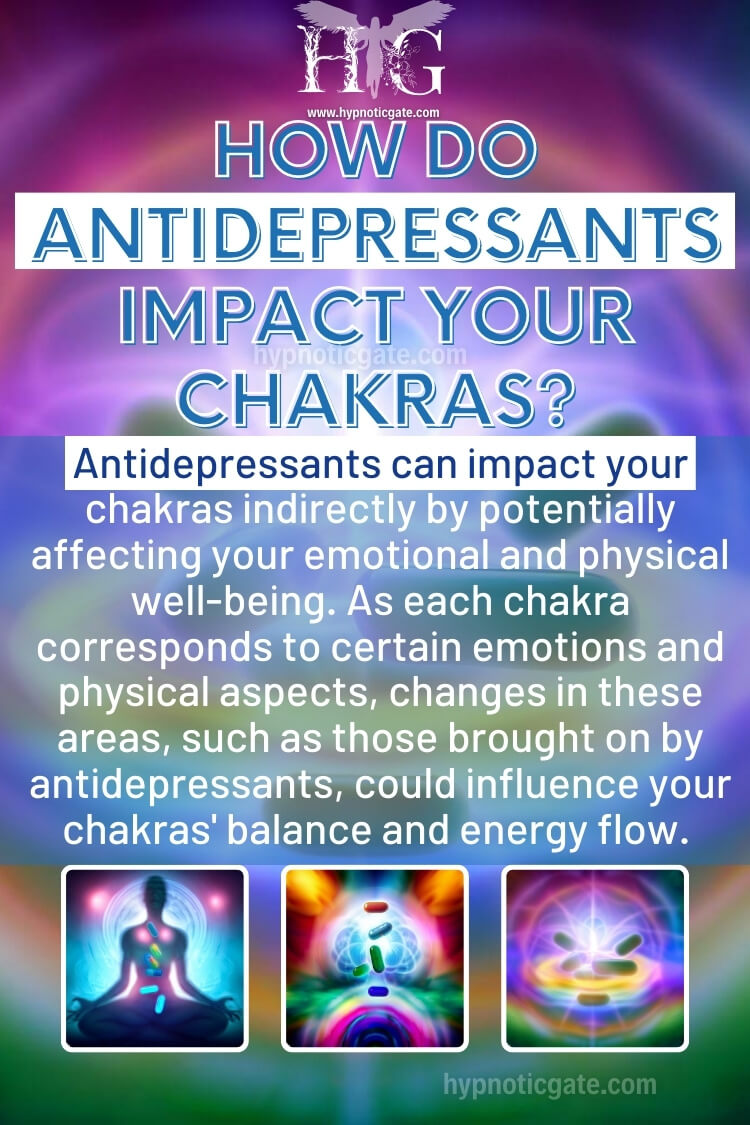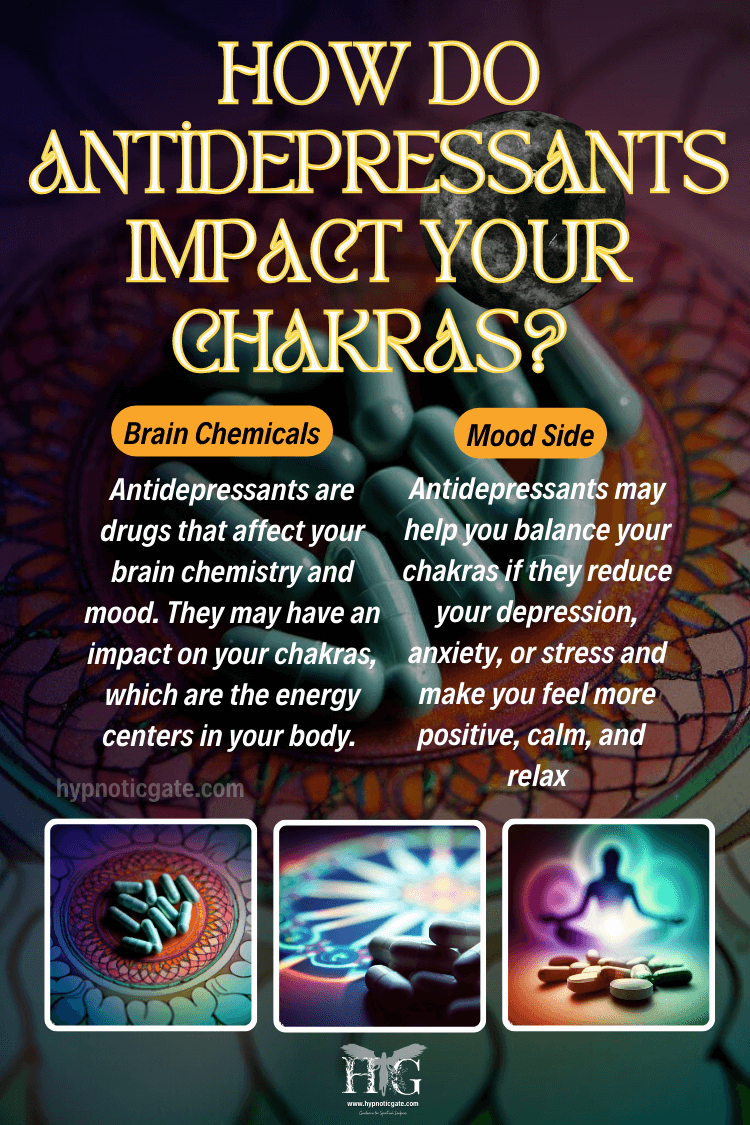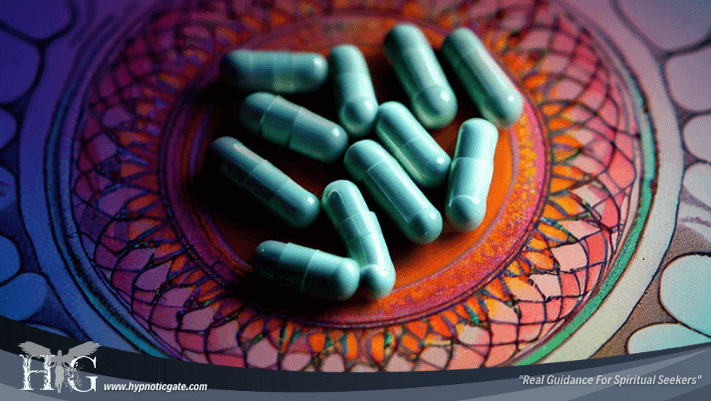
Antidepressants, often used for depression and other mental health issues, can be effective but aren’t right for everyone. They may bring possible side effects. Also, they influence brain chemicals.
Some believe antidepressants might affect your energy centers or chakras, positively or negatively, based on your reaction to them. Taking antidepressants might bring about certain side effects, like feeling sleepy, having a dry mouth, feeling constipated, or experiencing sexual problems. Still, some spiritual folks ask, “Do antidepressants affect the chakras?” and “How do they impact the energy centers?”. This piece will shed light on amulets and their link to chakra calmness.
What Is The Antidepressant?
Antidepressants aid in reducing feelings of sadness, despair, and anxiety. They tweak your brain’s chemical usage that alters your mood and feelings. You have options like SSRIs, SNRIs, MAOIs, and tricyclics. However, antidepressants may lead to side effects. These effects include dry mouth, weight gain, feeling light-headed, regular headaches, issues with intimacy, and disconnected emotions.
How Do I Know If I Need An Antidepressant?
Feeling down or upset can take over your routine. An antidepressant may provide the relief you need. This applies if alternative solutions haven’t worked. Examples include a chat with a counselor or a shift in your activities. Dead giveaways of depression include a persisting low mood, crankiness, thoughts of fatality or self-harm, and disinterest in things you previously liked. Antidepressants function by boosting key brain chemicals. They manage to do this while exciting specific circuits in the brain.
What Is Chakras?
Your body has energy centers called chakras. They look like circles or wheels of energy that link to your nerves and organs. Your chakras work well when they are open and balanced. You have seven main chakras in your body, each with a different color, place, and meaning. The seven chakras are:
- The root chakra (red) is at the bottom of your spine. It is about your family, safety, and money.
- The sacral chakra (orange) is under your belly button. It is about your creativity, feelings, and sexuality.
- The solar plexus chakra (yellow) is over your belly button. It is about your power, confidence, and self-esteem.
- The heart chakra (green) is in the middle of your chest. It is about your love, kindness, and healing.
- The throat chakra (blue) is at your throat. It is about your communication, expression, and truth.
- The third eye chakra (indigo) is between your eyes. It is about your intuition, vision, and wisdom.
- The crown chakra (violet) is at the top of your head. It is about your spirituality, connection, and enlightenment.
Do Our Brain Chemicals Connect to Chakras?
The brain and chakras don’t literally align, as chakras derive from Eastern medicine, which Western science doesn’t acknowledge. Still, the brain and chakras could be observed as two distinct systems that might impact one another.
Consider the amygdala. It’s a part of the brain dealing with emotions and stress. It might tweak our energy and induce emotional changes. It’s believed to stir the “root chakra.” Coupled with this, specific brain chemicals like serotonin and dopamine, which manipulate mood, might also sway one’s emotional status.
Do Antidepressants Block Chakras?

It’s not quite accurate to claim that antidepressants obstruct chakras. Chakras are a notion from Eastern medicine, not officially acknowledged in Western science. However, antidepressants can influence the body and mind–possibly affecting a person’s vigor and emotional health.
At the same time, these drugs could facilitate chakra balance if they alleviate depression, anxiety, or stress, resulting in a cheerful, tranquil, and harmonious state. Interested in alternative procedures for stress, anxiety, or melancholy? There’s a range to choose from–hypnosis, meditation, stress-reducing exercises such as workout routines or yoga. These could likely help.
Related: Hypnosis Vs. Meditation: What’s the Different?
Antidepressants, Empathy, and Heart Chakra
Saying antidepressants “block” empathy isn’t correct. Empathy is intricate, shaped by many brain factors. Plus, your heart chakra could be blocked. Eastern medicine sees the heart chakra, or Anahata chakra, as the energy hub for love and compassion. If you’re on antidepressants and feel less empathy or connection, chat with your doctor about it. It’s crucial.
Can You Meditate While You’re Using Antidepressant Pills?
Indeed, meditating during antidepressant use is possible. Mind and body practices like meditation, yoga, or tai chi could enhance the benefits of antidepressants and boost your overall health. Meditation trains your mind to focus. This focus could be an object, a thought, or even a task. It’s a tool to soothe the mind, lessen stress and worries, and boost overall health. Some studies suggest that meditation might change brain chemistry. It could alter neurotransmitter levels, like serotonin and dopamine. These changes can affect one’s feelings of anxiety and depression.
The root chakra is also believed to be connected to the amygdala, a part of the brain that processes emotions and stress. When the root chakra is out of balance, an individual may experience anxiety or insecurity and have difficulty coping with stress.
Why is Stress Important for Depression?
Stress and anxiety can cause your brain to make less new cells. This can affect how you feel overall. We think that buttons, like serotonin and dopamine, might be off-kilter in the brain, causing us to feel anxious or depressed. Some folks find that medicines called antidepressants help.
Yet, these pills might cause some not-so-nice side effects, for short bursts or long stretches of time. But hey, don’t worry! Others find that things like calming the mind, picturing peaceful scenes, and focusing on their energy can do wonders for feeling balanced and good. However, always make sure to talk to a doctor or other health pro if you’re worried about your body or mind not feeling right.
It is vital to note that the concept of chakras is not recognized by Western science and that there is no scientific evidence to support the existence of chakras.
What Are the Long-term Side Effects of Antidepressants?
Antidepressants aid in managing depression and other mental illnesses. Although effective, they can cause side effects, both temporarily and over time. Side effects range from weight fluctuations and sexual issues to dry mouth and bowel changes. They can also cause fatigue, blurry vision, blood pressure shifts, and blood sugar difference. Withdrawal symptoms, like dizziness, nausea and flu-like signs can occur if people stop taking them. Therefore, it’s usually advised to slowly reduce antidepressant consumption instead of quitting abruptly, to limit withdrawal symptoms.
These medications can also alter brain chemistry, particularly transmitters like serotonin and dopamine, which may unexpectedly impact mood and actions. If you’re worried about antidepressants’ long-lasting effects or experiencing withdrawal symptoms, chat with your healthcare provider. They can guide you on what to do next and propose alternative treatments, like therapy, or methods like hypnosis, if they suit you.
Natural Ways For Helps Depression and Spirituality
If you want to explore natural solutions for depression, several approaches may be helpful. These may include:
- Cognitive behavior therapy: This therapy involves identifying and changing negative thought patterns and behaviors that may contribute to your depression.
- Hypnosis: Hypnosis is a state of altered consciousness in which the person is highly suggestible and open to new ideas and perspectives. Some people find that hypnosis can help reduce anxiety and promote relaxation.
- Gratitude: Expressing gratitude and focusing on what you are thankful for can help shift your perspective and promote feelings of well-being.
- Progressive muscle relaxation: This technique involves tensing and releasing different muscle groups to create a sense of relaxation and calm.
- Mindfulness: Mindfulness can profoundly transform your life by altering how you engage with the world, yourself, and your experiences. At its core, mindfulness is the practice of being fully present in the moment, aware of your thoughts, feelings, and sensations without judgment. This simple yet powerful shift in awareness can lead to significant changes in your mental, emotional, and physical well-being.
Remember, no single approach fits all. Each person has unique needs. A pro provides the best guidance! They support you at each step.
Suggestion to read:
- Self Hypnosis: How To Allow Me To Be Hypnotized?
- How Do I Get Out Of Self-hypnosis?
- Hypnosis And Human Behavior: How Does Hypnosis Affect?
Suppose you are considering using natural solutions for your depression. In that case, it is important to discuss your treatment plan with your healthcare provider to ensure it is safe and appropriate.

